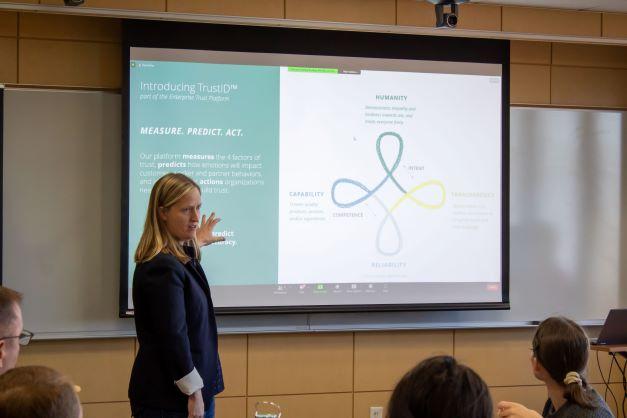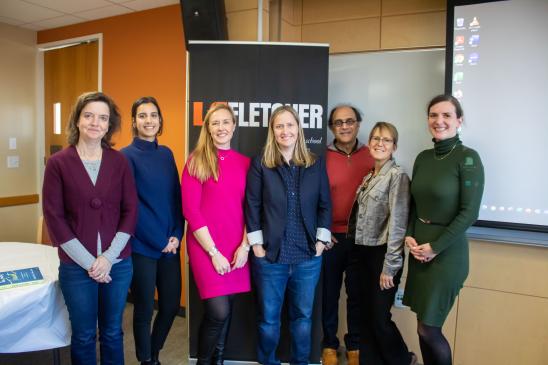-

Hear from Professor Monica Toft
Learn how Professor Monica Toft is shaping the study of global affairs and diplomacy at Fletcher.
Hear from Prof. Toft -

Explore Fletcher academics in action
Fletcher Features offers insights, innovation, stories and expertise by scholars.
Get global insights -
Get application tips right from the source
Learn tips, tricks, and behind-the-scenes insights on applying to Fletcher from our admissions counselors.
Hear from Admissions -

Research that the world is talking about
Stay up to date on the latest research, innovation, and thought leadership from our newsroom.
Stay informed -
Meet Fletcherites and their stories
Get to know our vibrant community through news stories highlighting faculty, students, and alumni.
Meet Fletcherites -

Forge your future after Fletcher
Watch to see how Fletcher prepares global thinkers for success across industries.
See the impact -

Global insights and expertise, on demand.
Need a global affairs expert for a timely and insightful take? Fletcher faculty are available for media inquiries.
Get in Touch
Sustainability Will Become Table Stakes—the Real Question is When
Institute for Business in the Global Context hosts talk with Deloitte Digital on trust and sustainability

If you spent any time in an airport this summer, odds are your flight was delayed or canceled. In a year of record disruptions, many travelers found themselves asking why they put so much trust in airlines that struggled to deliver.
Disgruntled fliers were just one of the subjects of Ashley Reichheld’s research into corporate and consumer trust, which she presented last Monday in a visit to campus hosted by the Institute for Business in the Global Context. Reichheld is the lead author of the book, The Four Factors of Trust, which examines the market implications of seemingly intangible human feelings. She presented with her co-author, Amelia Dunlop, who leads Deloitte’s human experience platform.
“We set this aspiration to elevate the human experience,” said Dunlop, Chief Experience Officer at Deloitte Digital. “We wanted to take a more human-centered approach, and what we quickly learned is you can’t elevate anyone’s experience if they don’t trust you.”
“We wanted something we can use as leaders. We run large parts of the organization inside Deloitte, we have lots of clients that we work with: what can we use to build trust with clients and on our teams?” she added.
Their curiosity stemmed in part from their observation of the cultural climate. Referring to a Gallup poll, Reichheld, principal at Deloitte Digital, explained how Americans’ trust in institutions—whether Congress, big business, organized religion, or the media—is at an all-time low. “Honestly, we’re no longer trusting of each other,” Reichheld said. “When we started this research, one of the questions we asked was, ‘Can you trust other people to social distance,’ and the resounding answer was no.”
Why does trust matter? For one, it is a C-Suite priority, yet most employers overestimate their workers’ trust by 40%. Part of this overestimation results from a misunderstanding of what trust even means.
Polling the audience for definitions revealed a range in understanding, everything from predictability to accuracy, or a sense of security. To get to the bottom of this ever-important, elusive trust, Dunlop and Reichheld conducted a multisectoral study of the concept. Though the definitions people hold for trust varied, the team found that the way it is built is consistent. Humanity, reliability, capability, and transparency are all essential components.
When customers believe that a company embodies these four qualities, they’re much more likely to recommend, promote, and stay loyal to a brand, even when mistakes are made. In the case of missed connections, if a customer trusts an airline and is delayed, the team saw little impact to consumer perceptions, yet when they didn’t trust the carrier, there was a 25% negative hit to the brand’s trust score.
Diagnosing the component parts of the trust ecosystem provides tools to improve relationships with employees and clients. Understanding whether trust is low because of perceived low humanity or transparency illuminates different solutions—low humanity might require intervening with more empathy while low reliability due to a delayed flight would require a heartfelt apology, an extension of benefits, and an explanation around what the airline is doing to resolve the issue.
While this certainly matters in a relationship between a brand and a consumer, it’s equally important between an organization and its employees. Their research found how building trust from within the organization reverberates to the consumer; workers who trust their employer are 260% more motivated to work, doubling customer satisfaction and yielding four times market capitalization. The change is tangible.
With consumers more attuned to the climate crisis, the team also created important hypotheses around sustainability. They found that while the four factors of trust correlate with sustainability, the link is weaker. However, there are notable exceptions to this rule.
They made a case study of Patagonia, the top retail apparel brand which has focused its mission around sustainability. While the clothing retailer was above average on capability and reliability, their fundamental commitment to green futures had a remarkable impact on humanity and transparency, where they scored 42% higher than the second ranked brand. Perhaps more importantly, high scores on humanity resulted in a 97% increase in purchasing a new product when launched and the high scores on transparency resulted in an 86% increase in spending more money with the brand compared to competitors.
“The fact that it’s integral to who they are, they are the most trusted among their peer set,” said Dunlop. “Sustainability will become table stakes given the way that leading organizations are focused on it and the relationship between trust and sustainability.”
The brand’s position around sustainability drives outsize behavior through strong humanity and transparency ratings. Their commitment, and resulting customer loyalty, are predictive of the future for other companies.
“Corporations are setting targets that are going to make sustainability critical to what they do,” said Reichheld. Manufacturers in the automobile industry are striving to move away from the combustible engine. Energy and gas companies are pledging carbon neutrality by 2040.
“Typically, we see things start with the customer and demand and companies responding to that, and here we see companies responding to the forthcoming regulations,” she added. “That tipping point is going to be fascinating to watch.”
In his closing comments, Dean Bhaskar Chakravorti spoke to another important intersection between sustainability and business: ESG, or environmental, social, and governance investing. The IBGC’s Digital Planet research initiative has studied trust as well, comparing national outlooks with new technologies.
“We are in the process of doing collaborative work with Deloitte on the question of whether trust translates in the investing and capital allocation spaces into investors and asset managers putting more capital against a company that is considered high on some sort of an ESG score,” Chakravorti said. “Does ESG translate into trust, and does trust translate into capital allocation?”
Read more about Fletcher’s MIB Degree Program.


